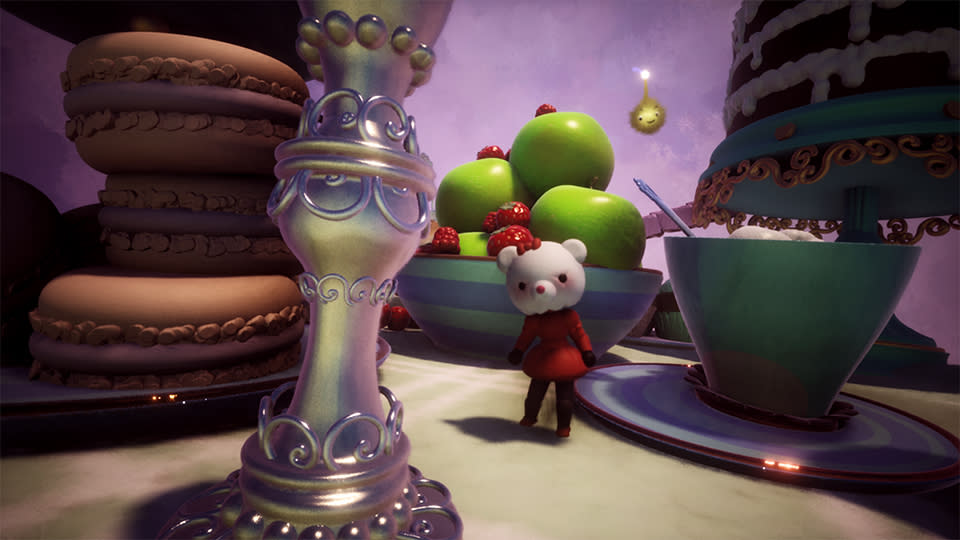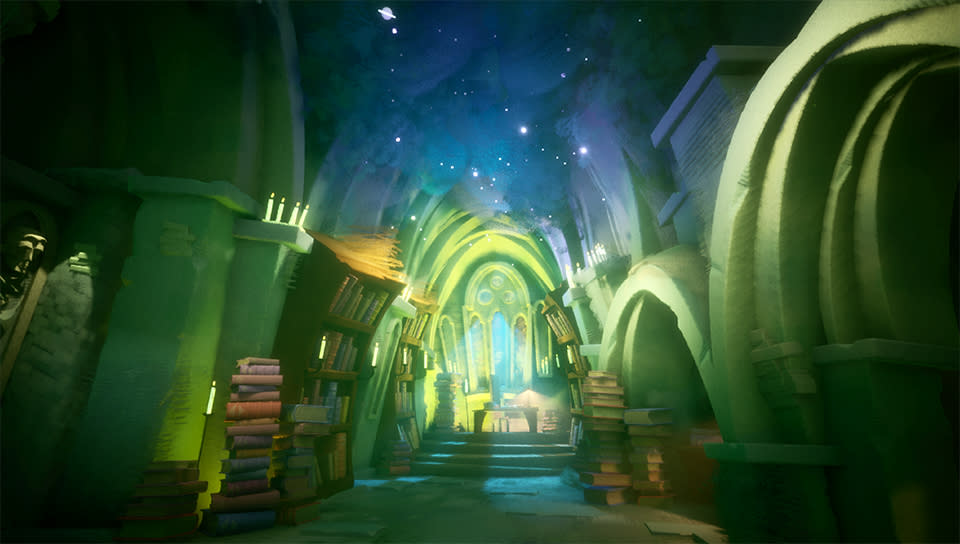'Dreams' isn't an enigma, it's 'LittleBigPlanet' reborn

Sony hasn't worked out how to explain Dreams, the new title from LittleBigPlanet and Tearaway creator Media Molecule. Its debut at E3 was exciting but enigmatic, with a focus on player-driven creation and animation mechanics. At Sony's Paris Games Week press conference on Tuesday, the studio showed off a little more of Dreams. But it still wasn't clear how exactly what was shown on screen would work in practice -- we've seen a lot of creation tools, but not a lot of gameplay. Luckily, Media Molecule took some time after the event to talk us through its grand vision for Dreams. And, despite the confusion, it most definitely will be a game.
The first thing you should know about Dreams is it'll have a traditional campaign. The developers told us at E3 that there'd "be Media Molecule content there," but it's becoming clear that this content will act, just like in LittleBigPlanet, as both a standalone adventure and a tutorial for creation. Mark Healey, creative director at Media Molecule, described a part of the campaign where you "might be asked to do some gardening." In doing so, you'll essentially learn the basics of creation, and after you're done, you'll be able to share the "shrub" asset you've created with the rest of the community.

This blurring of the lines between gameplay, creation, and sharing is key in Dreams. So much so that those playing the beta test will dramatically inform the final game. The "structured content" (i.e., campaign) won't be finished, but beta testers will get "less structured" versions of it to try out. So what's the difference between Dreams and, say, Destiny's campaign beta? Dreams' testers will be able to remix and modify Media Molecule's levels. They'll be able to experiment and create their own games using pre-existing assets or create entirely new ones.
Right now, only around 30 people are making in-game dreams. Getting thousands of people beta testing and making things is going to be huge for the team. "The beta is there to help us evolve the game," explained technical director Alex Evans. "We think we know what it is, but maybe the beta will change our minds."
Much like the sliver of the game shown at E3, the demo at Paris Games Week only hints at the possibilities for Dreams. It introduces the "Imp," a customizable water droplet with a face that acts as your avatar in the game. You can use the Imp to create things, interact with objects or to "possess" characters. "It's really a glorified cursor," Evans joked. The Imp is controlled via motion, but once your Imp possesses a character, you'll be able to control it using both motion and traditional analog stick input. You might have worries about gaming via motion controls, but it seems quite natural here -- almost like puppetry.

As for the campaign itself, you can bet on Media Molecule mainstays like platforming and puzzle-solving, but that's just the start. "You can make amazing first-person shooter levels if that's what you want to do," explained Evans. We've already seen racing and flying games in sizzle reels, and the team is dreaming of the "new game genres" that could be created within Dreams.
All of the "electronics" (Media Molecule's name for the instructions that make games move and react to input) developed for the LittleBigPlanet series are there; they're just refined and improved upon. The team is trying to make it simpler for inexperienced creators to get involved by letting them use both its and other users' creations. You'll be able to, for example, search for "door with hidden lock," and then insert and remix it in your game, rather than creating it from scratch.
"It's a full-on game-development system."
Once you're more comfortable, though, there are near-limitless possibilities. Healey claims Dreams offers "a full-on game-development system" in which Media Molecule staffers have already built their own takes on titles like MotorStorm and Tetris. You'll even be able to add your own cut scenes, animating characters using the controller and recording the results. The animation process, as we've seen in previous demos, is a world away from the complexities of traditional 3D animation, and for good reason. "If it's as fast as you performing it, then if you mess it up, you just do it again," explained Healey. "It doesn't matter -- it only took you five seconds."
While Healey and Evans were espousing the game's merits, Media Molecule Art Director Kareem Ettouney showcased the game's modeling system on a screen behind them. He employed a pair of PlayStation Move controllers, but you can also use the PlayStation's regular DualShock 4 controller. As you'd imagine for someone with his job title, he's an incredible artist, creating and remodeling things from scratch in seconds. He interjected at points, likening regular 3D modeling tools to "NASA software," and said watching someone create characters and objects in Dreams is more akin to "watching a painter or a dancer" honing their craft. That's certainly true -- it's quite mesmerizing -- but the aim is that everyone will be able to do this. It's hoped you'll be able to create as well as Ettouney by using motion controls to sculpt in three dimensions, and activating simple gestures to access additional features. "We want people to be able to access all the tools without them feeling like they're editing," Ettouney said. "It should feel like spells, like magic."

"Magic" is a good way to describe Dreams -- or at least Media Molecule's aspirations for the game. Although in the demo there was a short wait between each, in the final game jumping between dreams will apparently be seamless. Part of this is down to the game's deeply innovative -- and very tough-to-explain -- graphics engine.
Dreams utilizes something called "signed distance field." It makes in-game assets smaller and real-time 3D modeling on the PS4 a reality.
Rather than using polygons to render 3D objects, Dreams utilizes something called "signed distance field." I've read through an enormous document and watched a half-hour talk on the graphics engine and it's still difficult to break down. The results are easier to convey: It makes in-game assets far smaller, and real-time 3D modeling on the relatively underpowered PS4 a reality. It does this by sending the list of actions used to create an object, rather than the result of those actions. The character model that Ettouney built, which might run into tens or hundreds of megabytes using a traditional polygon system, apparently takes up "less than 50KB" space with the signed-distance field method. As the system is very efficient with storage requirements, it also allows for streaming and collaboration among multiple players with lower bandwidth needs.
In many ways, Dreams isn't that much of a departure from Media Molecule's past titles. Its most famous games have always focused heavily on user-generated content. The young studio is quite open about the fact that the LittleBigPlanet games, however well-received they were, didn't get everything right. Evans noted that the company's "obsession" about dividing the "play, create, share" options was actually hampering progress. "We got stuck in this mentality of them being separate things," he said.

Media Molecule is obviously leaving that notion behind now, mashing the three together into what it hopes will be a singular experience. But it's also learning from the way people approach playing other games with a focus on creation. "There's a bunch of different games that have a sandbox-y vibe," explained Evans. "[In these games] you're not just aiming at publishing; you're just building a city in SimCity or making a house for the night in Minecraft. You're actually just playing."
"The VR version is going to be amazing."
The demo ended with a question about PlayStation VR. Evans and Healey openly admitted back at E3 that VR support is "an obvious thing" for the game, and it's clear that the idea is still on their minds. Both started to answer slightly coyly, but the back-and-forth quickly devolved into an outright admission that Dreams VR (not an official title) is definitely happening.
Right now, the team is focused on releasing the game "to the maximum number of PS4 owners," said Evans, adding that Media Molecule will think about that after it's done with the game. "I think it's the holy grail of VR myself -- these virtual worlds with user-generated content that you can just watch," said Healey. "The VR version is going to be, like, amazing," Evans added. "We'd be mad not to try."
We're live from France for Paris Games Week 2015. Click here to catch up on all the news from the show.
